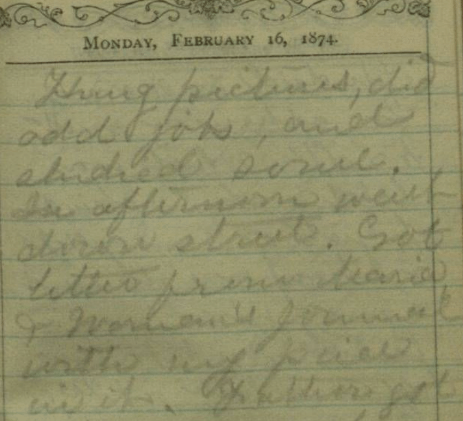“There is no substantial reason why women should be denied the privilege of the ballot”
Lavinia Goodell, February 1874
February 1874 was a busy month for Lavinia Goodell. She studied law for hours nearly every day, in anticipation of taking a bar exam that would enable her to officially become a lawyer and begin practicing. She attended Ladies Temperance Union meetings and drafted a petition calling for the repeal of liquor sales in the State of Wisconsin, which she sent to Assemblyman Noah Comstock.
On Monday, February 16, 1874, Lavinia noted in her diary that the day’s mail had brought the Woman’s Journal “with my piece in it.”

The piece in question was titled “Eminent Legal Protests Against the Wrongs of Women,” and, as with so many of Lavinia’s writings, it advocated for women having full equality with men, both in terms of property rights and by having access to the ballot.
Lavinia was spurred to write the piece after reading an article about Aaron Burr in the January 7, 1874 edition of the New York Weekly Evening Post. The Post article had mentioned Burr’s brother-in-law, Tapping Reeve, who “was the first eminent lawyer in this country who dared to arraign the common law of England for the severity and refined cruelty in cutting off the natural rights of married women, and placing their property as well as their persons at the mercy of their husbands.”

“For the information of any who may imagine that the wrongs of Woman exist only in the inflamed imagination of a few ‘fanatical’ Woman’s rights reformers,” Lavinia offered commentary from other legal writers. She quoted at length from Edward Christian, a Professor of Law at the University of Cambridge in his 1803 notes to Blackstone’s Commentaries, criticizing the injustice of the law in its application to women. Christian said:
Husband and wife, in the language of the law, are styled baron and feme; the word baron, or lord, attributes to the husband not a very courteous superiority. But we might be inclined to think this merely an unmeaning technical phrase, if we did not recollect that if the baron kills his feme it is the same as if he had killed a stranger, … but if the feme kills her baron it is regarded by the laws as a much more atrocious crime, as she not only breaks through the restraints of humanity and conjugal affection, but throws off all subjection to the authority of her husband. And therefore the law denominates her crime a species of treason, and condemns her to the same punishment as if she had killed the king.
Christian went on to say, “With regard to the property of women, there is taxation without representation, for they pay taxes without having the liberty of voting for representatives.”
Lavinia concluded:
If Judge Christian were living now, … I think, dear Boston ladies, he would have been with you at the Tea party, and not with those who sneer at the Woman Suffrage agitation as the result of the efforts of a few restless and discontented women not happy in their proper sphere, and thirsting for notoriety.
Where are the Judge Christians of today? Some of them have come up bravely to the rescue. And the rest? Well, they will jump on to the car of progress just in time to ride into glory!

Read the entire piece here.
Sources consulted: Lavinia Goodell’s diary, February 1874; Eminent Legal Protests Against the Wrongs of women,” published in the Woman’s Journal, Vol. 5, No. 7, 2/14/74, seq. 57, Schlesinger Library, Radcliffe Institute, Harvard University.







